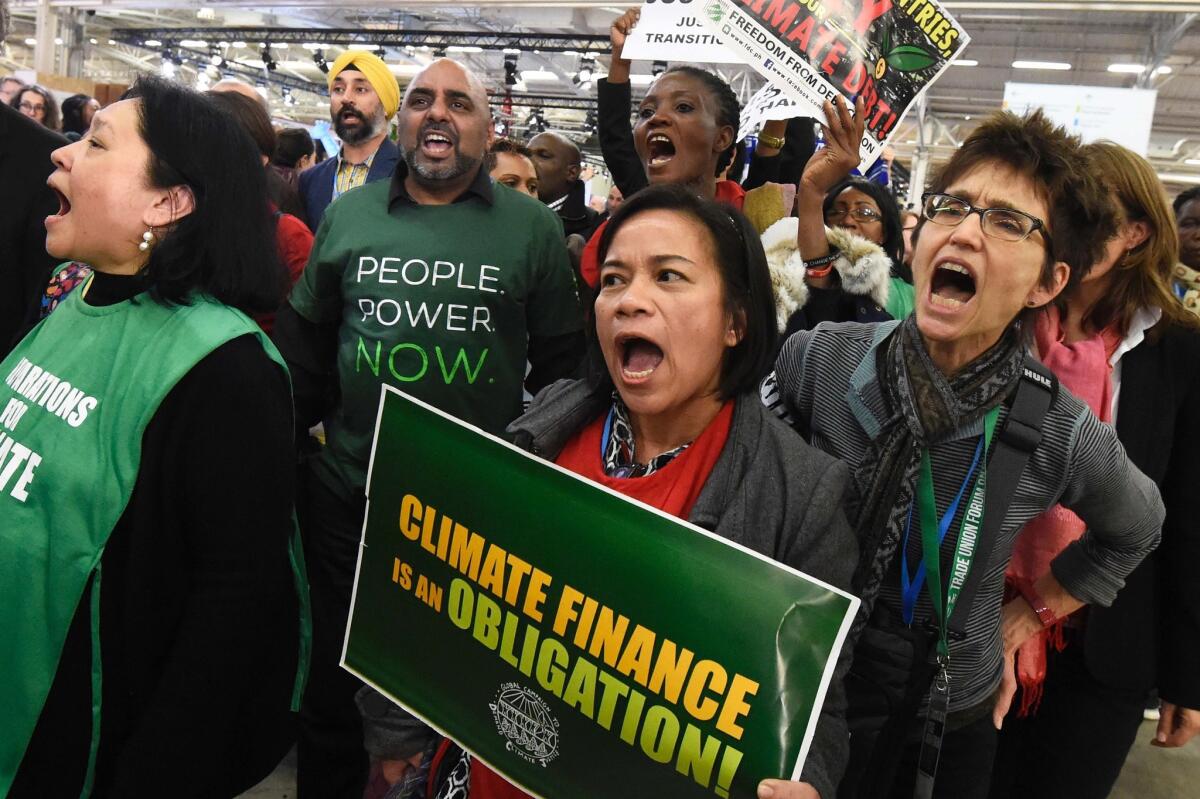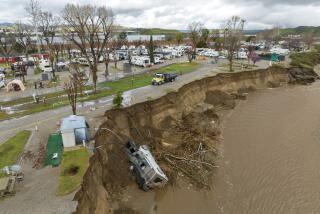Who pays for change remains a key question at the Paris climate talks

Demonstrators during the United Nations conference on climate change at Le Bourget, on the outskirts of Paris, on Dec. 9, 2015.
International negotiators in Paris have been huddled late into the night hashing out the details of a climate change agreement to slow rising global temperatures by reducing greenhouse gas emissions. With the nearly 2-week-long United Nations Climate Change Conference scheduled to end Friday, the issue of finances appears to be one of the biggest sticking points. It relates to who will pick up the costly tab of dealing with the damage already caused by global warming and at least slowing down whatever harm is yet to come. Here are a few key questions and answers on the multibillion-dollar issue.
What is climate finance and what is the money needed for?
As the Earth warms up because of climate change, nations are being forced to adapt. Climate finance is about how much money is needed to meet those changes, what specifically the cash should be used for and who is going to pay for it.
Climate finance money is used to combat the effects of global warming in two main ways. The first is to use it for mitigation purposes. Many developing countries are interested in investing in projects that will be both profitable and energy efficient in the long term, but they lack funds. A country may, for example, be unable to develop solar panels without outside investment. Such nations, therefore, look to wealthier, developed countries to invest in these initiatives, which have an environmental benefit.
Climate finance money is also used for adaption. The countries that are most vulnerable to climate change are generally those with the least resources. A nation may want to build a dam to prevent floods or relocate residents away from coastal areas. It is an expense that many developing countries cannot afford and to adequately protect residents the government may have to divert money from vital services such as education and healthcare. This could have a detrimental domino effect on a country’s broader advancement. Developing nations want wealthier, developed nations to help foot the bill.
NEWSLETTER: Get the day’s top headlines from Times Editor Davan Maharaj >>
“Adaptation finance is the recognition that there are real costs associated with climate impacts and developing countries do not have the resources themselves to deal with those costs,” said Sonja Klinsky, senior sustainability scientist at the Julie Ann Wrigley Global Institute of Sustainability at Arizona State University. “They would have to divert funds from absolutely core elements of their own developments, which would be fundamentally unfair.”
What are the differences in points of view?
Aside from mitigation and adaptation, there is much debate on how to deal with countries that are not fully developed but already provide significant finance to combat climate change, such as China. There is a well-versed argument that the developed countries caused climate change and therefore they should be the ones to pay for fixing it. No one disagrees that responsibilities differ among nations, and that developed nations should lead the way but the extent to which they do so is a matter of contention.
There is also disagreement about whether financial contributions should be voluntary or obligatory. The United States has a strong philanthropic tradition and gives an enormous amount of money to aid, but does not want to feel that it owes any country money. “It’s a principle,” Klinsky explained.
The issue of technological innovation is also key. Developed nations have greater capacity to fund research into new sustainable technologies, but the developing world wants to ensure that these advances are also beneficial and accessible to them.
Small island states are pressing for compensation for climate change damage they have already suffered, so-called loss and damage. The United States and other countries are reluctant to introduce new legal liabilities into the text of the agreement that could open them up to a raft of legal and financial vulnerabilities.
ActionAid’s Harjeet Singh warned that loss and damage was “not a bargaining chip.” Prime Minister Enele Sopoaga of Tuvalu was in no mood to compromise on the topic at a news conference last weekend.
“The world is dragging its feet,” Sopoaga said. “We must have loss and damage included in the legal agreement out of Paris.”
He said there were “worrying signals” that deals were being made outside the conference process.
How much money will be needed?
It is hard to put a precise figure on the amount of money needed. Previous estimates about the cost of emerging technologies have been wildly off, but a recent report from the United Nations Environment Program estimated that developing countries would require about $300 billion annually by 2050 to meet all their adaptation needs.
Why has this become such a big sticking point at these talks?
Many of the ideas being discussed are not new, but the language surrounding climate finance has developed in recent years and the debate has matured. There is also now far greater awareness and understanding of what climate change means, hence a renewed urgency to act.
“I think people are getting closer to the realization that climate change is a serious problem,” said Alexander Golub, American University environmental science professor. “There is more and more evidence that it’s happening and it needs to be addressed. When you figure out how to communicate risks and uncertainties then it’s much easier to convince people to prevent those issues.”
There has also been emotive language from small-island leaders this week. Some said their homelands could be submerged if measures were not taken to counteract climate change.
“This is not an academic issue for the Pacific Island countries, this is a matter of life and death for us,” said Cook Islands Prime Minister Henry Puna. “We believe that there needs to be a new additional predictable and accessible finance for small island states because of their special circumstances in terms of climate change.”
Marshall Islands Foreign Minister Tony de Brum said the Paris climate change conference was the most important journey of his life. He said he refused to leave without a deal that allowed him to look his grandchildren in the eye.
Boyle is a special correspondent.
MORE ON CLIMATE CHANGE
How the buildings we live in add to the threat from global warming
Brown touts ‘coercive power of government’ to attack climate change
California billionaire Tom Steyer has rare access and a big megaphone on climate change
More to Read
Start your day right
Sign up for Essential California for news, features and recommendations from the L.A. Times and beyond in your inbox six days a week.
You may occasionally receive promotional content from the Los Angeles Times.






